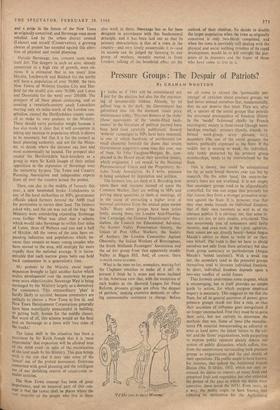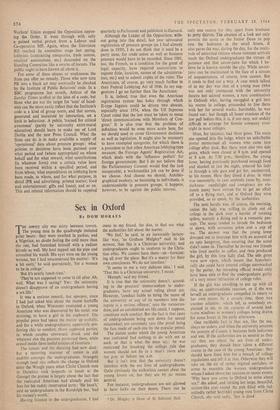Pressure Groups : The Despair of Patriots?
WOOTTON By GRAHAM
IT looks as if 1964 will be remembered not I just for the election but also for the murmur- ing of innumerable lobbies. Already, by its gallant leap in the dark, the Government has galvanised into life the dormant resale price maintenance lobby. 'Discreet dinners at the clubs' (those equivalents of the 'smoke-filled back- rooms' in the literature of political parti6) have been held (and carefully publicised). Several `write-in' campaigns to MPs have been mounted, in one of which hundreds of soothsayers (or retail chemists) foretold the doom that awaits Government supporters some time this year; one of these. Sir John Vaughan-Morgan, Bt., com- plained in the House about their unveiled threats, which originated, I can reveal, in the National Pharmaceutical Union and the Proprietary Ar- ticles Trade Association. As I write, pressure is being sustained by deputation and petition.
The farmers. too, are hard at it. Brooding now upon their real incomes instead of upon the Common Market, they are writing to MPs and putting sharp questions to them at meetings, all in the cause of extracting a higher level of national assistance from the annual price review `talks.' Many other groups have been active lately, among them, the London Anti-Fluorida- tion Campaign, the General Practitioners' Asso- ciation, the Council for Educational Advance, the Kennet Valley Preservation Society, the Union of Post Office Workers, the Society of Authors, the London Committee Against Obscenity, the Indian Workers of Birmingham, the South Midlands Passengers' Association and the ad hoc group from that apparently muddy Valley at Biggin Hill. And, of course, there is much more to come.
What is the man on (or, nowadays. waiting for) the Clapham omnibus to make of it all? At present I think he is more and more inclined to the American view that, with the exception of such bodies as the Howard League for Penal Reform, pressure groups are often 'the despair of patriots,' making excessive demands or offer- ing unreasonable resistance to change. Before `I'd like you to meet Mummy.' we all come to exceed the 'permissible per- centage' of cynicism about pressure groups, we had better remind ourselves that, fundamentally, they do not deserve that label. They are, after all, a species of the social groups that provide the structural prerequisites of freedom (from). In the `model' fashioned chiefly by French sociologists, society is three-tiered (though mem- berships overlap): primary (family, friends, in- formal work-group, army platoon, etc.); secondary (the rest of the social groups); the nation, politically expressed as the State. If the middle tier is missing or weak, the individual, only feebly protected by his primary group memberships, tends to be overwhelmed by the State.
This is theory, but could be substantiated (so far as such broad theories ever can be) by research. On the other hand, the man-in-the- strect's fears are not irrational. It is not simply that secondary groups tend to be oligarchically controlled, for one can argue that precisely for that reason they form a stronger protective struc- ture against the State. It. is, however, true that
o
they may make inroads on individual freedom, that of their own members as well as of the relevant publics. It is obvious, too, that some in- terests are not, or only weakly, articulated. This was notoriously true of consumers until fairly recently, and even now, in the r.p.m. agitation, their voices are not directly heard—hence Angus Maude's advice to them to `write in' on their own behalf. The truth is that we have to shield ourselves not only from State autocracy but also from group autocracy or particularism (Angus Maude's 'vested interests'). With a weak top tier, the secondary (and so the pressure) groups themselves tend to threaten individual freedom. In short, individual freedom depends upon a two-way conflict of social forces.
That formula undermines some dogmas, which is encouraging, but in itself provides no simple guide to action, for which purpose empirical inquiry is necessary. This suggests to me that the State, for all its general accretion of power, gives pressure groups much too free a rein, so that their accretion of influence goes unregulated if no longer unremarked. Free they must be to press their suits, but not entirely to determine the methods they use. Some of these (the manufac- tured PR material masquerading as editorial or even as hard news; the faked 'letters to the edi- tor' and the 'front' organisations, both purporting to express public opinion) plainly debase our system of public discussion, which suffers, too, from the secretiveness surrounding both pressure groups as organisations and the real details of their operations. The public ought to have known, for instance, that behind the Additional Import Duties (No. 3) Order. 1953, which not only in- creased the duties on imports of many fresh and preserved fruit and vegetables, but also extended the period of the year in which the duties were operative, there stood the NFU. Even more, in a way, the public ought to have known that lobbying by spokesmen for the Agricultural Workers' Union stopped the Opposition oppos- ing the Orden It went through with only a pained verbal protest from a Labour and Co-operative MP. Again, when the Television Bill reached its committee stage last spring, lobbyists (contracting companies, trade unions, retailers' associations, etc.) descended on the Standing Committee like a swarm of locusts. The public ought to have known all about it.
For some of these abuses or weaknesses the State can offer no remedy. Those who now turn PR into a black art may eventually be checked by the Institute of Public Relations' code. In a BBC programme last month, Atticus of the Sunday Times scoffed at the idea of a code, but those who are not the target for 'tons' of hand- outs can the more easily reflect that the Institute's code is a kind of group norm, and that norms, generated and sustained by interaction, set a limit to behaviour. A public 'trained for critical awareness' (partly by university extra-mural education) should learn to make use of Lord Devlin and the new Press Council. What the State can do is to make available a supply of 'operational' data about pressure groups: what policies or decisions have been pursued over what period and (where appropriate) on whose behalf and for what reward; what contributions (in whatever form) over a certain value have been received within a specified period, and from whom; what expenditures on lobbying have been made, to whom, and for what purpose, in detail (PR and advertising; printed matter; food and entertainment; gifts and loans), and so on. This and related information should be supplied quarterly to Parliament and published in Hansard.
Although the Leader of the Opposition, with- out going into this detail, last year advocated registration of pressure groups (as I had already done in 1959), I do not think that it need be a party issue, for trade union as well as business pressure would have to be recorded. Since 1901, too, the French, as a condition for the grant of legal capacity, have required associations to register (title, location, names of the administra; tors, etc.) and to submit copies of the rules. The Americans, of course, go very much further in their Federal Lobbying Act of 1946. In my sug- gestions I go no further than the Americans.
It is, indeed, true that even the American registration system has holes through which E-type Jaguars could be driven two abreast, especially since 1954, when the US Supreme Court ruled that the law must be taken to mean 'direct communications with Members of Con- gress.' It is also true that the problem of definition would be even more acute here, for we should need to cover Government decisions as well as legislation. It might also be necessary to have exempted categories, for which there is a precedent in that other American lobbying-type measure, the Foreign Agents' Registration Act, Which deals with the 'influence pedlars' for foreign governments. But I do not believe that the Parliamentary Counsel would find the task insuperable; a workmanlike job can be done if we choose. And choose we should. Autobio- graphical modesty, so becoming in individuals, is understandable in pressure groups; it happens, however, to be against the public interest.



































 Previous page
Previous page